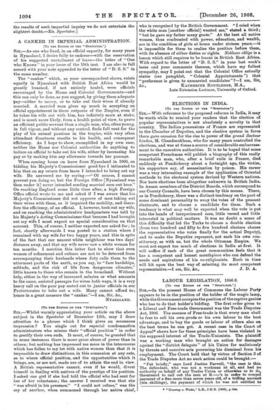ELECTIONS IN INDIA.
[To THE EDITOR or THE SPECTATOR."
SIR,—With reference to the proposed reforms in India, it may be worth while to remind your readers that the election of popular representatives is not absolutely a novelty in that country. The Indian possessions of France are represented in the Chamber of Deputies, and the elective system in force there gave occasion for the rise to power of the grand electeur hindou, M. Chandmukham, who for many years controlled the elections, and was at times a source of considerable embarrass- ment to the executive authorities. It is to be hoped that some competent Frenchman will publish a biography of this really remarkable man, who, after a brief exile in France, died suddenly at Pondicherry about a fortnight ago, the victim, his supporters say, of assassination by poison. His career was a very interesting example of the application of Oriental methods to the electoral system devised by Western nations. Nor have elections been altogether unknown in British India. In Assam members of the District Boards, which correspond to our County Councils, have been chosen by this means. There, as in Pondicherry, there was a distinct tendency on the part of some dominant personality to sway the votes of the peasant electorate, and to choose a candidate for them. Such a tendency is what may well be expected when the vote is put into the hands of inexperienced men, little versed and little interested in political matters. It was no doubt a sense of this difficulty that led the Turks to choose a double election (from two hundred and fifty to five hundred electors choose the representative who votes finally for the actual Deputy), and to make the Deputies represent, not each his own con- stituency, as with us, but the whole Ottoman Empire. We must not expect too much of elections in India at first. It will suffice if each of the great communities feels that it has a competent and honest mouthpiece who can defend the needs and aspirations of his co-religionists. Each in time will hit upon the best way of selecting its most competent representative.—I am, Sir, &c., J. D. A.






































 Previous page
Previous page